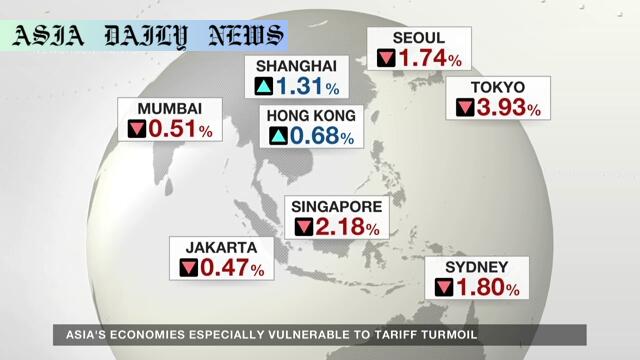Stock markets dropped globally amid concerns of a recession, while selected Asian indexes showed marginal gains on policy hopes.
- Global stock markets are showing volatility due to recession fears.
- Taiwan, Sydney, and Seoul markets reported notable declines.
- Positive movement observed in Shanghai and Hong Kong on policy hopes.
- European shares faced drops in Frankfurt, London, and Paris.

Global Volatility Amid Economic Concerns
On Wednesday, stock markets around the world reflected significant volatility as concerns over a potential global recession continue to heighten. Major indexes in several regions experienced alarming declines, with investors increasingly questioning the resilience of national and international economies. Amid fears of economic slowdown, markets in Taiwan, Europe, and Australia bore particular brunts, reflecting the fragility of investor sentiment worldwide.
Taiwan’s benchmark index, the TAIEX, plunged by a staggering 5.79% compared to the previous trading day’s performance. Such a dramatic dip underscores the increasing unease among investors in the region, further fueled by broader unfavorable global trends and uncertainties in trade relationships.
Regional Differences in Asia
While Taiwan’s TAIEX experienced a pronounced drop, contrasting signs emerged in other parts of Asia. Notably, the Shanghai Composite and Hong Kong’s Hang Seng indexes marked gains of 1.31% and 0.68%, respectively. Reports of the Chinese government discussing potential measures to stabilize the markets revitalized investor confidence despite broader concerns. These moves reflect the role that policy interventions can play in reinforcing economic stability and market sentiment, even amidst challenging global conditions.
However, not all Asian markets mirrored the optimism of Shanghai and Hong Kong. Sydney’s key stock measure exhibited a 1.8% fall, while South Korea’s KOSPI index edged downward, reflecting broader economic concerns in the Pacific region. Such weaknesses highlight how regional variations can influence overall financial ecosystems, with interconnected economies responding differently to global trends.
European Declines and Investor Sentiments
Across the European continent, stock market indexes similarly reflected economic pessimism. The benchmark index in Frankfurt declined by 2.4% at its lowest point from Tuesday’s close, while Paris and London also suffered with drops of 2.3% and 2.2%, respectively. Investors in these regions seem increasingly apprehensive about the potential ripple effects of a US economic slowdown on their local economies.
Global interdependence makes the US market a critical influencer of international trade and economic performances. The increasing likelihood of contraction in the US economy signals broader repercussions, further pushing European investors toward risk-off positions and diversifying into safe-haven assets.
Conclusion: Staying Vigilant in Uncertain Times
Overall, the dynamic interplay of global economic conditions, regional financial systems, and policy measures shape the current volatility in stock markets. The index performances from Taiwan, Europe, and parts of Southeast Asia underline the increasing caution among market participants. At the same time, the stabilizing moves in Shanghai and Hong Kong serve as a reminder of how targeted government actions can have a counterbalancing effect during times of uncertainty. As global economic events unfold, stakeholders worldwide will need to stay vigilant to navigate these challenging market conditions with prudence.



Commentary
The Struggle of Global Markets
Stock markets worldwide are undergoing a volatile phase, raising questions about the overall stability of the global economy. The sharp declines in major indexes across regions such as Taiwan, Europe, and Australia reflect investor panic and the influence of macroeconomic uncertainties. Such circumstances are a reminder of how interconnected economies can transmit vulnerabilities across borders. The possibility of a recession, particularly driven by concerns of a US slowdown, looms large, painting a grim picture of the near-term economic landscape.
The Role of Policy Measures
While market turbulence signifies a challenging environment, the positive performance seen in markets like Shanghai and Hong Kong illustrates the power of effective policy communication. In the face of global adversity, the Chinese government’s readiness to discuss stabilization measures shows the importance of proactive policymaking. It acts as a stabilizing force, temporarily cushioning investor panic and offering a glimmer of hope amidst regional market declines.
Conclusive Reflections
For investors, the current environment demands not only caution but also alertness to opportunities. Periods of volatility often lead to realignments in portfolios, sector priorities, and investment strategies. With both risk and opportunity in play, the coming weeks and months will serve as a test of adaptability for individuals and institutions. Staying informed and responsive to both regional developments and macroeconomic shifts will be crucial in mitigating losses and capitalizing on gains.